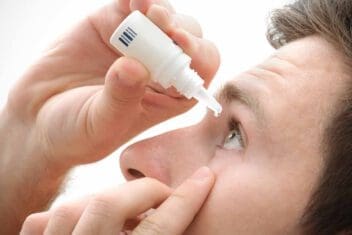
Medically Reviewed by Jonathan Pirnazar, M.D. NVISION Surgeon
How Allergies Affect Your Eyes (& Best Treatment Options)
Home / Vision Education Center /
Last Updated:

Medically Reviewed by Jonathan Pirnazar, M.D. NVISION Surgeon
Table of Contents
When your allergy season kicks in or when you find yourself in an environment that’s not right for you, the signs of misery are eyes that swell, itch, get watery or turn red. These are the tell-tale symptoms that your body is allergic to something around you, and living with them is no fun.
An excess of pollen, ragweed and dust can trigger an allergic reaction that can make it difficult to see and impossible to feel good. Fortunately, eye allergies are treatable.
Identifying potential irritants in your environment and removing them is your first line of treatment. Also, an eye exam is often necessary to rule out any other underlying cause, such as eye infection.
Untreated eye allergies can advance to vision-threatening disorders, so make sure to get medical help as soon as possible. Your eye doctor can provide an accurate diagnosis and proper treatment to ease your discomfort.
What are Eye Allergies?
When a foreign particle or substance such as dust enters your eye, your body naturally releases histamine to protect you. An eye allergy can occur as your immune system’s reaction to the presence of the irritant or allergen.
This reaction is also called allergic conjunctivitis, and it can cause eyelid discomfort and swelling. It can also affect the conjunctiva, the tissue layer that covers the front part of your eye and lines the inside of your eyelids.
You deserve clear vision. We can help.
With 135+ locations and over 2.5 million procedures performed, our board-certified eye surgeons deliver results you can trust.
Your journey to better vision starts here.
You may also experience itching – and a persistent urge to rub your eyes. In more serious cases, your eye turns so red and swells so much as it seeks to fight off the allergen that it seems as if it is infected. Such allergies are common, but not everybody has a significant reaction when dust or pollen gets into their eyes. They have a higher level of tolerance, just as some people are more vulnerable.
You may be at risk, too, if you experience nose allergies on exposure to foreign particles inside and outside your home or office environment. The severity of your allergic reaction can vary based on many factors.
While some people experience only lid inflammation, others suffer corneal irritation and scarring. You can minimize your risk of developing eye allergy complications with early management and treatment.
Symptoms of Allergies Affecting the Eyes
You may experience the following symptoms when you have an eye allergy:
- Red eyes
- Swollen eyelids
- Teary eyes
- Eye irritation
- Abnormal sensitivity to light
- Itchy eyes
While nasal and eye allergies can affect you at the same time, neither of them causes the other. Both your eyes and nose may have been exposed to an allergen (likely the same one) if you get these two conditions simultaneously.
In that case, you may also experience other discomforts like nasal congestion, post-nasal drip, coughing and frequent sneezing.
Causes of Eye Allergies
You may have an allergic reaction if your eyes come into contact with certain chemicals or airborne allergens. Indoor causes of eye allergies are generally irritants circulating in the air or trapped in common household items and surfaces. These include:

- Dust
- Pet dander
- Mold
Outdoor triggers include pollen from sources like:
- Grass
- Trees
- Weeds
Exposure to the following chemicals or substances may also cause eye allergies:
- Cigarette smoke
- Medications like eye drops
- Cosmetic products like perfume
- Diesel fumes
- Bleach
- Ammonia
Indirect exposures and risk factors include:
- Genetics (when both or one of your parents has an eye allergy)
- Having certain food allergies
- Insect bite or sting allergies
How Eye Allergies are Diagnosed
When your eyes start to itch, swell, water consistently or turn red, you can visit an ophthalmologist for an official diagnosis and treatment plan. You may also want to visit an allergist to learn if you have food and environmental allergies.
Your eye doctor will run specific tests to rule out some potential causes of your misery. They’ll also need to know if you have any predisposing factors, including pre-existing allergies or parents with or a family history of allergies.
Only after providing an accurate diagnosis for allergic conjunctivitis can your doctor prescribe proper treatment to ease your symptoms.
Common eye tests for eye allergies include a slit lamp and a white blood cell test.
Slit Lamp
A slit lamp is a special microscope used to examine the front parts of the eye where allergic reactions can occur. It is design to look closely at the blood vessels and smaller capillaries in your eyes. Swollen vessels are one sign of an allergy.
White Blood Cell Test
This is not a straight-forward blood test, and doctors don’t usually prescribe this test for a normal allergic reaction (red eyes, itchy eyes or watery eyes). Your symptoms have to be more severe for this test to make sense.
Doctors will turn to this exam if your eyes are extremely irritated or red or if they’re swollen. The procedure entails extracting and examining certain eye tissues, especially in the eye’s conjunctiva.
Results will show your white-blood cell count, a clue that your immune system is working overtime to repel an allergen.
Tips for Prevention
You can reduce your risk of getting eye allergies by practicing a bit of prevention. In short: eliminate or minimize your exposure to potential irritants. But first you must know what to avoid and how to avoid it.
Some practical preventive measures include:
Visit an Allergist
Get an appointment with a local allergist, preferably during a time when you are not suffering from an allergy attack. Depending on your medical insurance, you may need to get a referral from your primary care physician to get the insurance coverage you want for this visit.
Your allergist will:
- Ask you to provide a detailed history of your allergies
- Ask you to describe your home and work environments
- Examine your eyes, ears, nose and throat
- Check your breathing
- Give you a series of allergy tests, which are minor pricks of the skin on your arm, shoulders and back
Within a few minutes of administering the allergy tests, the doctor will read the bumps on your skin – your body’s signal that you have (or don’t have) specific allergies. The doctor will likely test for both environmental allergens (ragweed, various trees and grasses, dog and cat dander, etc.) and food allergens (nuts, yeast, eggs, chocolate, etc.).
If you do have allergies, you can expect your doctor to want to treat them as soon as possible.
Protect Your Eyes from Pollen
- Unless it’s unavoidable, stay indoors when there’s too much airborne pollen outside (usually in the mid-morning, early evening and in windy weather)
- Use protective eyewear when you’re outdoors
- Close your car and house windows to prevent pollen from entering
Avoid Indoor Allergens
- Install an efficient air conditioner to eliminate airborne pet dander, dust mites, and other fine debris
- Maintain humidity levels of about 30 to 50 percent inside your house to limit mold buildup
- Regularly clean up any mold in usually wet areas like the basement or bathroom
- Install a dehumidifier if necessary
- Replace traditional bed covers with more allergen-resistant options to reduce dust mite exposure
- Keep your duvets, pillows and other bedding dust-free by washing them regularly in hot water
- Minimize exposure to dander by keeping your pets outside your house as much as practical
- Don’t let your dog or cat into your bedroom
- Avoid floor carpets as these can trap pet dander
Look at Other Measures
Discuss your options with your doctor if you’re allergic to certain drugs, such as eye drops.
You deserve clear vision. We can help.
With 135+ locations and over 2.5 million procedures performed, our board-certified eye surgeons deliver results you can trust.
Your journey to better vision starts here.
Treatment and Relief
Here are some remedies that may help relieve the swelling, irritation, and other eye allergy symptoms:
Home Remedies
- Replace allergen-infested household items like carpets and pillows
- Cool compresses can reduce the itchiness and urge to rub your eyes
- Avoid rubbing your swollen eye due to an allergic reaction
- You may need to stop wearing contact lenses if they trigger your eye allergies
Drugs
- Allergy shots
- Allergy drops under your tongue (immunotherapy)
- Anti-inflammatory steroid eye drops and lubricants
- Nonsteroidal anti-inflammatory agents (NSAIDS) like ketorolac or diclofenac
- Antihistamines like ketotifen, olopatadine, or azelastine
- Mast cell stabilizers like disodium cromoglycate or Lodoxamide
- Decongestants
Over-the-Counter Medications to Help Your Eyes
For some people, the above tips may still not be enough to achieve reasonable control over their symptoms. Several OTC and prescription medications are available to treat allergies, although it is important to only take these as intended.
One major contributor to allergy symptoms is a chemical in your body called histamine. This neurotransmitter serves several roles in the body, but it can also cause unwanted side effects related to allergies. As such, many medications that treat allergies affect the mechanisms related to histamine in some way.
While OTC medications tend to be less harsh than prescription drugs, they still should be taken with caution. Follow their instructions, and bear in mind their risks and side effects. Some OTC medications that can help with eye allergies include:
- Tear substitutes. These are artificial tears that keep the eyes moist. They can also wash allergens from the eyes. Tear substitutes tend to be safe and can be refrigerated, allowing them to be cooler and potentially more soothing. Artificial tears are good for dry or irritated eyes. They carry few risks if used properly.
- Oral antihistamines. Antihistamines can be used to treat allergies, and they can relieve eye itching for some people. However, for some people, they can potentially worsen symptoms and cause eyes to dry out. Antihistamines can cause dizziness, excitability, and sedation. If you experience serious side effects, stop taking them until you see a doctor.
- Decongestants. Good for temporary relief of redness in the eye, decongestants should not be taken for more than three days. Doing so can cause your symptoms to get worse. People with glaucoma should not use decongestants, as they narrow the blood vessels in the eye. Some decongestants are also antihistamines, helping to relieve both redness and itchiness.
Prescription Allergy Medications for the Eyes

If OTC solutions are not enough, talk to your doctor about your other options. Some prescription solutions to allergies include:
- Allergy shots. These help people build resistance to whatever causes their reaction by administering gradually increased doses of the allergen over the course of a period of a few months. This does not always erase symptoms, but it can often reduce them.
- Antihistamine eyedrops. Similar in properties to the antihistamines described earlier, these drugs are prescription grade. They still carry many of the disadvantages of eyedrops, namely that they must be applied often. You may need to use them four or more times in a single day for best effect.
- Mast cell stabilizer eyedrops. These drops work by preventing the release of histamines, which cause allergy symptoms, as well as other substances that can contribute to allergies. Notably they work best before you are exposed to allergies, as they cannot prevent itching that is already occurring.
- NSAID eyedrops. Nonsteroidal anti-inflammatory drugs (NSAIDs) help to relieve itching, but they can cause burning and stinging as well. Like other eyedrops, they must be applied multiple times a day.
- Corticosteroid eyedrops. Meant for chronic, severe eye allergies, these can cause fairly serious side effects in the long term, including glaucoma, cataracts, and infection. However, they can help to reduce itching, swelling, and redness when other solutions are proving inadequate.
- Non-sedating oral antihistamines. These prescription antihistamines can help some people with allergy symptoms, and they have different side effects than regular antihistamines. They are only mildly effective at relieving itching for most people, and they can still cause dryness to worsen.
Eye Problems that Allergies Can Lead to if Untreated
If you think you have an eye allergy, there are two things you must do, preferably as soon as possible:
- See your ophthalmologist
- Comply with the prescribed treatment plan
Untreated eye allergies can cause severe complications such as:
- Dry eye
- Infection
- Scarring in the eye
- Permanent blindness
Constant rubbing of the eye due to the itching may trigger major vision problems such as:
- Keratoconus, which affects the cornea and may cause vision loss
- Limbal stem cell deficiency (LSCD), which also impacts corneal tissues, and may cause blurred vision or blindness
- Bloodshot eyes after rupturing tiny blood vessels in the eyes
- Worsening of pre-existing visual problems like myopia or glaucoma
You deserve clear vision. We can help.
With 135+ locations and over 2.5 million procedures performed, our board-certified eye surgeons deliver results you can trust.
Your journey to better vision starts here.
References
- Allergies: Symptoms & Causes. (January 6, 2018). Mayo Foundation for Medical Education and Research (MFMER).
- Eye Allergy. American College of Allergy, Asthma & Immunology.
- The Dangers of Rubbing Your Eyes. (July 25, 2016). Vision Eye Institute.
- National Allergy Forecast & Info About Allergies. IQVIA.
- What are Eye Allergies? (September 2019). American Academy of Ophthalmology.
- Allergic Conjunctivitis. (2017). Community Eye Health Journal.

Dr. Pirnazar is known as the one of the best LASIK surgeons in Orange County, California. Having performed over 55,000 refractive and cataract surgeries, Dr. Pirnazar’s specialties include LASIK, PRK and cataract surgery. Thanks to his expertise, Dr. Pirnazar and his partners at NVISION were selected to be the official team ophthalmologists for the Los Angeles Chargers.
This content is for informational purposes only. It may have been reviewed by a licensed physician, but is not intended to serve as a substitute for professional medical advice. Always consult your healthcare provider with any health concerns. For more, read our Privacy Policy and Editorial Policy.
